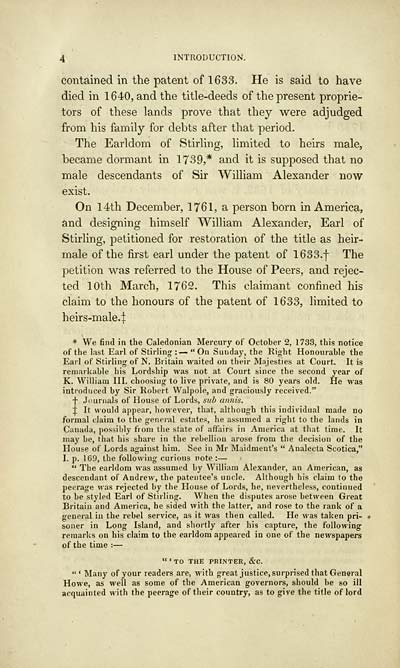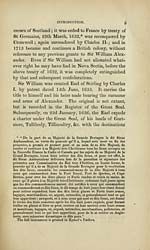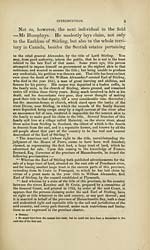Stirling peerage
(14) Page 4
Download files
Complete book:
Individual page:
Thumbnail gallery: Grid view | List view

4 INTRODUCTION.
contained in the patent of 1633. He is said to have
died in 1640, and the title-deeds of the present proprie-
tors of these lands prove that they were adjudged
from his family for debts after that period.
The Earldom of Stirling, limited to heirs male,
became dormant in 1739,* and it is supposed that no
male descendants of Sir William Alexander now
exist.
On 14th December, 1761, a person born in America,
and designing himself William Alexander, Earl of
Stirling, petitioned for restoration of the title as heir-
male of the first earl under the patent of 1633.f The
petition was referred to the House of Peers, and rejec-
ted 10th March, 1762. This claimant confined his
claim to the honours of the patent of 1633, limited to
heirs-male-t
* We find in the Caledonian Mercury of October 2, 1733, this notice
of the last Earl of Stirling :— " On Sunday, the Right Honourable the
Earl of Stirling of N. Britain waited on their Majesties at Court, It is
remarkable his Lordship was not at Court since the second year of
K. William III. choosiug to live private, and is 80 years old. He was
introduced by Sir Robert Walpole, and graciously received."
f Jnuriials of House of Lords, sub aiinis.
j It would appear, however, that, although this individual made no
formal claim to the general estate.^, he assumed a right to the lands in
Canada, possibly from the state of affairs in America at that time. It
may be, that bis share in the rebellion arose from the decision of the
House of Lords against him. See in Mr Maidment's " Analecta Scotica,"
I. p. 169, the following curious note : —
" The earldom was assumed by William Alexander, an American, as
descendant of Andrew, the patentee's uncle. Although his claim to the
peerage was rejected by the House of Lords, he, nevertheless, continued
to be styled Earl of Stirling. When the disputes arose between Great
Britain and America, he sided with the latter, and rose to the rank of a
general iu the rebel service, as it was then called. He was taken pri- .
soner in Long Island, and shortly after his capture, the following
remarks on his claim to the earldom appeared in one of the newspapers
of the time : —
" ' TO THE PnlNTER, &C.
"' Many of your readers are, with great justice, surprised that General
Howe, as well as some of the American governors, should be so ill
acquainted with the peerage of their country, as to give the title of lord
contained in the patent of 1633. He is said to have
died in 1640, and the title-deeds of the present proprie-
tors of these lands prove that they were adjudged
from his family for debts after that period.
The Earldom of Stirling, limited to heirs male,
became dormant in 1739,* and it is supposed that no
male descendants of Sir William Alexander now
exist.
On 14th December, 1761, a person born in America,
and designing himself William Alexander, Earl of
Stirling, petitioned for restoration of the title as heir-
male of the first earl under the patent of 1633.f The
petition was referred to the House of Peers, and rejec-
ted 10th March, 1762. This claimant confined his
claim to the honours of the patent of 1633, limited to
heirs-male-t
* We find in the Caledonian Mercury of October 2, 1733, this notice
of the last Earl of Stirling :— " On Sunday, the Right Honourable the
Earl of Stirling of N. Britain waited on their Majesties at Court, It is
remarkable his Lordship was not at Court since the second year of
K. William III. choosiug to live private, and is 80 years old. He was
introduced by Sir Robert Walpole, and graciously received."
f Jnuriials of House of Lords, sub aiinis.
j It would appear, however, that, although this individual made no
formal claim to the general estate.^, he assumed a right to the lands in
Canada, possibly from the state of affairs in America at that time. It
may be, that bis share in the rebellion arose from the decision of the
House of Lords against him. See in Mr Maidment's " Analecta Scotica,"
I. p. 169, the following curious note : —
" The earldom was assumed by William Alexander, an American, as
descendant of Andrew, the patentee's uncle. Although his claim to the
peerage was rejected by the House of Lords, he, nevertheless, continued
to be styled Earl of Stirling. When the disputes arose between Great
Britain and America, he sided with the latter, and rose to the rank of a
general iu the rebel service, as it was then called. He was taken pri- .
soner in Long Island, and shortly after his capture, the following
remarks on his claim to the earldom appeared in one of the newspapers
of the time : —
" ' TO THE PnlNTER, &C.
"' Many of your readers are, with great justice, surprised that General
Howe, as well as some of the American governors, should be so ill
acquainted with the peerage of their country, as to give the title of lord
Set display mode to:
![]() Universal Viewer |
Universal Viewer | ![]() Mirador |
Large image | Transcription
Mirador |
Large image | Transcription
Images and transcriptions on this page, including medium image downloads, may be used under the Creative Commons Attribution 4.0 International Licence unless otherwise stated. ![]()
| Histories of Scottish families > Stirling peerage > (14) Page 4 |
|---|
| Permanent URL | https://digital.nls.uk/95006018 |
|---|
| Description | A selection of almost 400 printed items relating to the history of Scottish families, mostly dating from the 19th and early 20th centuries. Includes memoirs, genealogies and clan histories, with a few produced by emigrant families. The earliest family history goes back to AD 916. |
|---|

